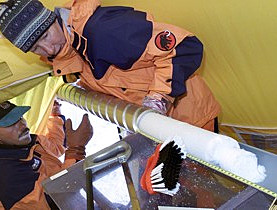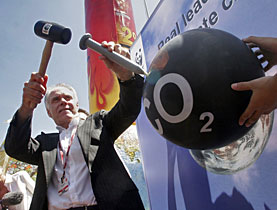Cabinet steps up greenhouse gas fight

The government has announced it wants to lower carbon dioxide emissions by at least 20 per cent by 2020 – a move that will bring it into line with the European Union.
Environment Minister Moritz Leuenberger said on Thursday measures could include a climate incentive tax. But for now there will be no general CO2 levy on fuels, as opponents feared.
The country has come in for criticism from international bodies and environmental campaigners for not doing enough for the environment.
The government wants a 20 per cent drop in greenhouse gases by 2020 – from 1990 levels. This would be followed by the more ambitious goal of 50 per cent by 2050, Leuenberger told a media conference in the capital, Bern.
This basically means a yearly reduction of 1.5 per cent. Buying CO2 certificates from abroad would help lower emissions by a further ten per cent, he added.
The aim is to follow the EU, which has set out a climate policy that seeks to limit future global warming to two degrees Celsius. Experts have warned that this is the minimum bearable level.
Switzerland’s current goals are a reduction in CO2 emissions by ten per cent by 2010.
The CO2 law, which came into force in 2000 to ensure these targets would be met, would have to be revised to achieve the new reduction aim, an environment ministry statement said.
Among the measures to be discussed is a so-called “incentive tax”, aimed at changing people’s behaviour rather than raising funds, or an incentive tax with partial allocation of funds for anti-CO2 measures in Switzerland.
The idea of a carbon neutral Switzerland is also on the cards, as well as other technical measures. Leuenberger expects a combination of all these proposals to be the final outcome. The draft law is expected to go into consultation this summer.
However, the government’s plans still have to be approved by parliament.
CO2 levy
Switzerland has signed up to the Kyoto Protocol on reducing greenhouse gases by an average of 5.2 per cent by 2012. It announced in November 2006 that it was on track to lower levels by eight per cent.
But reaching the Swiss targets of ten per cent would be difficult, as there is still 0.5 million tons of CO2 outstanding, said the statement.
Until then the “climate centime” scheme, a legally non-binding charge levied on petrol and diesel imports at a rate of 1.5 centimes per litre, will be overhauled and other proposals studied. But no higher tax is envisaged at present, said Leuenberger, overturning media reports that a 50 centime charge per litre could be slapped on fuel from 2010.
In terms of energy, the goals are to reduce the use of fossil fuels by 20 per cent and increase renewable energy usage by 50 per cent by 2020. Leuenberger also wants the population to become more energy conscious.
Reaction to the plans has been mixed. The political parties to the left and green organisations said that the 20 per cent reduction was not enough and criticised the lack of general CO2 levy on fuel.
But the economy as well as fuel and motoring organisations welcomed the proposals. But some, such as the rightwing Swiss People’s Party, raised concerns that there were no real measures to tackle future electricity problems.
swissinfo with agencies
The Swiss parliament ratified the Kyoto Protocol on climate change in 2003. Switzerland undertook to reduce its CO2 emissions to 10% less than 1990 levels by 2010.
However, some experts are doubtful that this target will be met. In 1990 greenhouse gas emissions stood at 53.3 million tonnes; in 2000 they were 52.7.
A CO2 law came into force in 2000 to ensure that the Kyoto target was achieved. About a thousand enterprises have taken voluntary measures measures to reduce their emissions.
But it became clear by 2005 that these measures were not sufficient.

In compliance with the JTI standards
More: SWI swissinfo.ch certified by the Journalism Trust Initiative



You can find an overview of ongoing debates with our journalists here. Please join us!
If you want to start a conversation about a topic raised in this article or want to report factual errors, email us at english@swissinfo.ch.